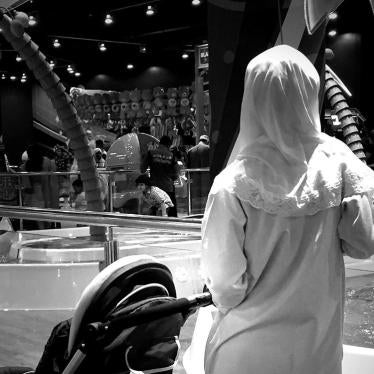(Washington, DC) - Governments across the Middle East should reform the kafala (sponsorship) system that gives sponsoring employers substantial control over workers and leaves workers vulnerable to situations of trafficking and forced labor, Human Rights Watch said today. The US State Department's annual Trafficking in Persons report, released today, ranked several countries in the region in its two lowest possible categories for efforts to combat human trafficking.
The report ranked Saudi Arabia and Kuwait in Tier 3, the lowest possible category, which makes these countries potentially subject to US sanctions of non-humanitarian aid, and Lebanon and Qatar on the Tier 2 watchlist, the second-lowest ranking.
"For efforts to end forced labor and human trafficking to be successful, governments in the Middle East should reform the current visa sponsorship system," said Nisha Varia, senior researcher in the Women's Rights Division at Human Rights Watch. "When employers have near-total control over migrants' ability to change jobs, and sometimes to leave the country, workers can get trapped in exploitative situations in which they are forced to work without wages, get beaten, or face other abuses."
Millions of migrants, primarily from Asia and Africa, have short-term employment contracts for low-wage jobs in the construction, domestic work, and service industries across the Middle East.
Saudi Arabia, the United Arab Emirates, and Jordan have adopted anti-trafficking legislation, and in some cases built shelters. Saudi Arabia has operated a shelter for female domestic workers since 1997, while Kuwait has maintained a shelter facility since 2007. The UAE government announced last month a decision to establish two new shelters for women and children victims of human trafficking and sexual exploitation.
However, other countries, including Lebanon and Kuwait, have yet to adopt anti-trafficking legislation, and most countries retain immigration laws that penalize rather than protect workers who work under conditions of abuse. In Kuwait, immigration regulations allow for criminal charges against workers who leave their jobs, even those who worked in abusive conditions, while in Saudi Arabia workers must have their employers' permission to get exit visas to leave the country.
With limited exceptions, governments in the Middle East require workers to obtain their original sponsor's consent before taking up new employment. In combination with gaps in labor protections and abusive recruitment practices that leave workers indebted, the kafala system gives employers tremendous control over workers.
Workers in Kuwait, Jordan, Lebanon, Saudi Arabia, and the United Arab Emirates interviewed by Human Rights Watch have reported employers withholding their passports and wages, and making them work long hours without adequate rest. Domestic workers in particular risk forced confinement, as employers at times lock them inside their homes or keep them under constant supervision.
"These countries consistently fall at the bottom of the list when compared to others around the world," said Varia. "It is disappointing that governments across the Middle East have been slow to change the kafala system when it is so easily abused."
In 2009, Bahrain adopted the strongest sponsorship reform in the region by permitting migrant workers to change employment without their employer's consent and in the absence of allegations of nonpayment of wages or abuse. In 2010, UN High Commissioner of Human Rights Navi Pillay urged all Gulf Cooperation Council countries to engage in sponsorship reform. However, like most progress in the region, Bahrain's positive changes do not apply to domestic workers.






